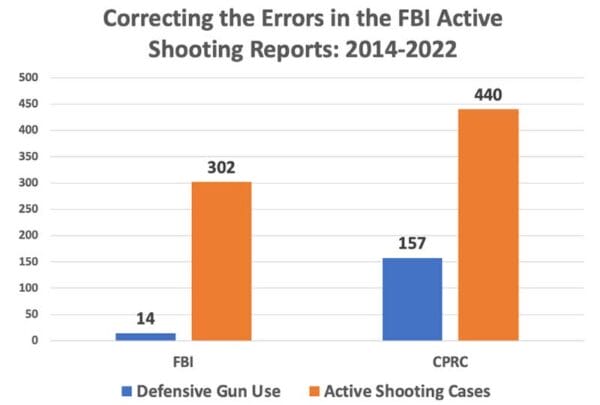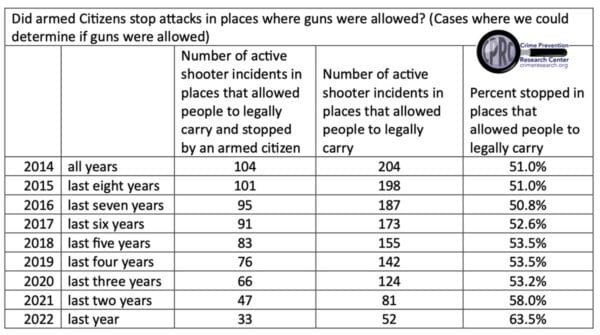
A new report by the Crime Prevention Research Center (CPRC) finds that the FBI’s Active Shooter Reports have massively underestimated the number of times armed civilians have stopped active shooter attacks. The CPRC analysis found that armed citizens stopped 157 of the 440 active shooter incidents that occurred between 2014 and 2022, a rate of 35.7%. This is significantly higher than the 4.6% rate reported by the FBI.
“The FBI’s Active Shooter Reports have significantly underestimated the number of times armed civilians have stopped active shooter attacks,” said John Lott, the CPRC’s president. “This is important information that the public needs to know in order to make informed decisions about gun policy.”
The Crime Prevention Research Center’s data forcefully highlights that the media’s primary sources have grossly undervalued the number of times armed citizens intervened in potential attack scenarios, overshadowing their life-saving acts by a factor greater than ten. Far from being an anomaly, armed citizens stopping these threats are more common than we’re led to believe. Yet, their heroics are all too often sidelined in national news coverage. While there are occasional implications in the news that using guns defensively might pose risks to others, no concrete evidence supports this biased claim.
The FBI’s official records indicate that from 2014 to 2022, armed citizens intervened in only 14 out of the 302 active shooter events they’ve identified. Their definition of such incidents centers on scenarios where an individual attempts or succeeds in killing others in populated public spaces, conveniently excluding situations associated with other crimes like robberies or territorial disputes over drugs.
However, a thorough review by the Crime Prevention Research Center pinpointed a total of 440 active shooter events during the same timeframe, with armed citizens stepping in 157 times.
An earlier report honed in solely on cases where armed individuals halted probable mass public shootings. An additional 27 scenarios where armed citizens preemptively acted against attackers—despite the absence of gunfire from the assailant—were not counted. Although these cases were left out, one could fiercely argue that these citizens indeed averted potential active shooting catastrophes.
The CPRC report found that the FBI’s reports have misclassified several active shooter incidents as non-active shooter incidents and that the FBI has also overlooked a number of incidents where armed citizens stopped attacks. For example, the FBI’s report on the December 2019 attack on the West Freeway Church of Christ in White Settlement, Texas, does not list this as an incident of “civic engagement.” Instead, the FBI lists this attack as being stopped by a security guard. However, a citizen volunteer parishioner was the “guard” who provided “security” during worship and who fatally shot the perpetrator.
The CPRC study revealed that the FBI’s data overlooks the number of active shooter events in gun-free zones, areas where carrying firearms is restricted for law-abiding individuals.
“The FBI’s reports are not accurate because they do not take into account the number of active shooter incidents that occur in gun-free zones,” said Carl Moody, the CPRC’s research director. “This is a serious problem because gun-free zones make it more difficult for armed citizens to stop active shooter attacks.”
The data estimates that about half of all active shooter incidents occur in gun-free zones.

The Crime Prevention Research Center report’s findings are significant because they suggest that armed citizens play a much larger role in stopping active shooter attacks than previously thought. The report’s findings also call into question the accuracy of the FBI’s Active Shooter Reports.
The report’s authors emphasize the need for the FBI to reevaluate its classification of what constitutes an active shooter incident and to refine and improve the way they document such events.
“The FBI needs to revise its definition of an active shooter incident and improve its reporting of active shooter incidents,” said Lott. “They also need to stop ignoring the role that armed citizens play in stopping these attacks.”
Eliminating Joe Biden’s signature gun-free zone law would go a long way to making it more difficult for armed citizens to stop active shooter attacks.
